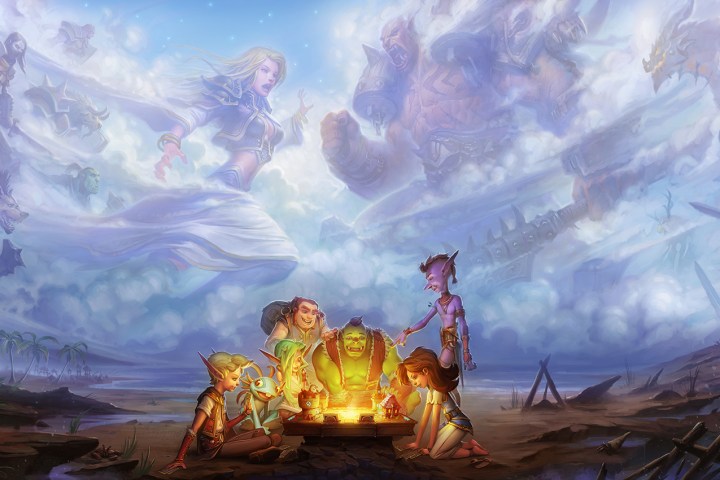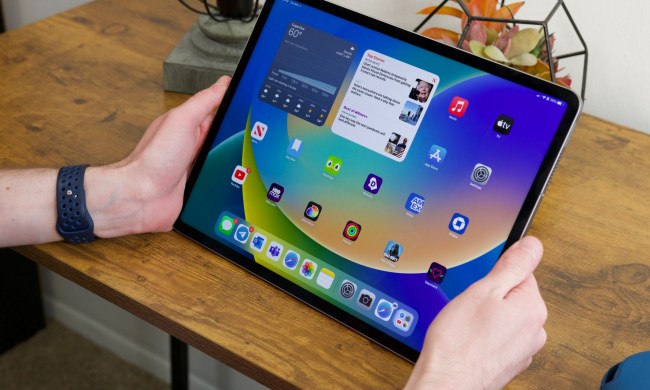
Of course, it can be difficult to get people together for a board game night whenever one wants, and even then they can be a mess to clean up. Thankfully, many popular board games now feature digital editions, nearly all of which are readily available for the iPad. Below are some of our favorites for Apple’s trademark tablet, whether you prefer feats of grand strategy or the simple pleasures of twiddling knobs.
Tiles, cards, and adventures in space
Carcassonne ($10)

Although many of the most popular board games can be mindbogglingly complicated — many a naive player has braved the sprawl of Arkham Horror, only to be left a quivering mess — sometimes simpler is better, especially when it comes to the iPad, where the touchscreen naturally emphasizes fewer systems. Carcassonne, a German game set in the famous French town, is one of the paragons of European board game design, with a basic set of rules and short duration that mask a surprising amount of strategic depth.
Carcassonne is notable in that players build the board as they go. The board consists of 72 tiles, one of which is the “main” tile placed at the start of the game. The rest of the tiles are placed face down and shuffled around, and each turn a player draws a tile and places it next to one already on the board, gradually building a map. Each tile depicts partial features such as fields, cities, roads, or monasteries, and on placing a tile, a player can also place one of their limited stock of pieces (called “meeples”) onto one of these features in an attempt to claim it. This can be a messy process when you’re dealing with the physical game, but on the iPad, there’s no need to shuffle or worry about the size of a table, making the whole experience smoother.
As players build the map, they attempt to complete the roads, cities, and monasteries, at which point the player with the most pieces gets points. Winning at Carcassonne thus requires players to think not just about how to build the longest road or biggest city, but also how to impede their opponent’s progress.
Ascension: Chronicle of the Godslayer (Free)

Fans of board games may likely remember collectible card games such as Magic: The Gathering, in which players assembled decks from hundreds of possible cards and battled one another in dorm rooms and cafeterias across the country. Many who once enjoyed such games may also have stopped playing, as the need to constantly purchase new sets of cards made them an expensive hobby. Enter the deck-building game, a young genre in which a group of players all acquire cards from the same pool, building their decks as the game progresses. Ascension, designed by former pro Magic players, is among the best in the genre, with diverse cards that allow for a variety of strategies and tactical improvisation.
There are two primary resources in Ascension: power, used to defeat monsters, and runes, used to acquire new cards. At the beginning of a game of Ascension, every player starts with a deck consisting of Militia and Apprentices, which provide a small amount of power and runes. Cards and monsters from the main deck are laid out in the center of the table, and players take turns slaying monsters and purchasing new cards for their deck. Acquiring cards and completing certain actions will net players points, called Honor, and at the end of the game the player with the most honor wins.
The iPad version of the game lays everything out well, utilizing the space available on screen. Cards are rendered beautifully — although players will obviously not have the tactile pleasure of holding them in hand —and all the important information, such as card types and resources, is easily readable. The quick pace of the game is also perfectly suited for online play, and those who develop an addiction to the game will enjoy the fact that expansion sets are much cheaper on the iTunes store than at a physical game shop.
Download it now from:
Galaxy Trucker ($5)

Galaxy Trucker is designed to appeal to two main demographics: people who like to build things, and masochists. The game consists of two main phases. The first is a building phase, in which players must draw tiles from a pool and arrange them in order to build ships before the timer runs out. Once the building phase is complete, players then draw event cards as they try to reach their destination, acquiring credits along the way. This is where the aforementioned masochists will have fun, as the universe portrayed by Galaxy Trucker is vast and cruel. Any number of dangers, including space pirates and asteroids, can wreck a player’s ship. It is not uncommon that no ships will make it through a round alive.
The build phase is crucial to success, as even a minor flaw, such as an exposed piece of connective tissue, can be a fatal weakness. Players will also need to equip their ships with tools such as laser cannons and shield batteries to survive the various dangers of the galaxy. Luck is the biggest enemy in Galaxy Trucker, and much of the fun comes not from success, but from trying to survive outrageous circumstances.
Even the best board game can be ruined in transition to the iPad if the developers are careless. Thankfully, this version of Galaxy Trucker is adapted well, with all the moving parts laid out intuitively on screen. The digital version includes both pass-and-play and online modes, making for a great multiplayer experience on the iPad. There is also a single-player campaign unique to the iPad version, for those who would rather blow their ships up in private.
Purchase it now from:
Hearthstone: Heroes of Warcraft (Free)

Blizzard’s second attempt at a World of Warcraft card game, Hearthstone has been a runaway hit despite its modest development (the original team consisted of 15 members). Hearthstone is an entirely digital card game, giving players all the fun of building decks and battling opponents without the necessary storage space for cards. Of course, some might argue that the feel of cards is part of the fun, which is why the game attempts to emulate the physical experience of playing a game. Players drag on drop their cards from their hands to the board, slamming them down with an audible thump.
Designed for both tablets and computers, Hearthstone streamlines the traditional card game experience. Players cannot take any actions on their opponent’s turn, which keeps the pace moving quickly, although some would argue this robs the game of the tactical moments that games like Magic excel at. There is plenty of strategy present in Hearthstone, however, with nine different classes to choose from, each with their own unique cards and strengths. The mechanics of the game are simple enough for anyone to pick it up and start playing, but with enough depth for more advanced players to distinguish themselves in all degrees of amateur to professional competition.
Of course, Hearthstone is a collectible card game, and the collectible part may prove a bit of a wall for new players. Everyone starts out with a basic set of cards for each class, and more can be unlocked by simply playing the game. The vast majority of cards will need to be acquired from booster packs or expansions, both of which can be purchased with gold earned through daily quests or with cash. There are hundreds of cards in the game already, with more added every so often, and building a complete collection is a daunting task. Still, for players who enjoy collecting cards and customizing decks, Hearthstone is easily the best CCG on the iPad.
Spaceteam (Free)

Perhaps including Spaceteam is stretching the definition of a board game a bit much, but between its simple interface and great potential as a party game, it seemed fitting to bend the rules. Allowing for two to eight players, Spaceteam puts each player in charge of a specific station on a spaceship. The game requires each player to use their own tablet or phone, which will display a control panel as well as information about incoming crises and what players need to do to counter them. Thus, players need to communicate effectively in order to progress.
Despite its simplicity, Spaceteam can be incredibly hard. As orders come in more and more quickly, players will often devolve into shouting over each other in order to relay the information in time. Quickly recognizing when you need to do something is essential, and the game’s interface is basic enough that novices can pick it up easily.
Download it now from:
Farms, trains, and infectious diseases
Agricola ($7)

One of the most acclaimed Eurogames, Agricola, puts players in the role of yeoman farmers who must raise livestock and crops over the course of 14 turns. There are many different actions players may take on a turn, such as collecting wood or plowing fields, but players are only allowed to make two. Moreover, each action can only be performed by one player each round, so if a player before you chooses to harvest wood, your upstart logging industry will have to wait until next turn.
Scoring in the game emphasizes balance; players are penalized for investing too heavily in one aspect of their farm. Thus, despite its simplicity, the game requires decision-making and long-term planning, which are complicated by the ambitions of rival players. In true German-style, Agricola keeps things deceptively simple. The game is easy to grasp, but even experienced players will find themselves challenged.
The game also translates well to the iPad, with the many game pieces laid out clearly on the board. Cute character designs and animations give it a lively feel that the physical game lacks, while online and single-player modes ensure players remain entertained for a long time.
Ticket to Ride ($7)

As one of the recent runaway hits in the world of board games, Ticket to Ride proves fantastic on the iPad, largely due to simple rules and an easy-to-use interface. The game tasks players with claiming the train routes that weave their way across the board, almost like Monopoly with transit routes instead of properties. Unlike Monopoly, however, the game doesn’t bury players beneath frustrating elements of chance.
At the start of the game, each player draws two destination cards tied to locations on the map. If players create a route connecting these two locations by the end of the game, they will be awarded points — failing to do so will result in a penalty. Each turn, players can either draw railway cards, draw new destination cards, or spend their railway cards to claim routes. Victory requires players to aggressively pursue their goals while also trying to cut off opponents. The game ends when a player has exhausted nearly all of their pieces, at which point players receive points for achievements like connecting destinations, or having the longest train route.
On iPad, the graphics are colorful without being overly busy. The board, cards, and pieces are all easily readable, and there are very simple animations to make things livelier. With both local and online play, Ticket to Ride is a relaxing game to play with friends anywhere.
Catan ($5)

The name Catan is probably at least vaguely familiar to anyone reading this list. Originally released in 1995 as Settlers of Catan, the game became an underground hit and eventually made German-style board games mainstream. Most modern board games owe their very existence to Catan’s success, and it’s not surprising why. Catan’s gameplay strikes a good balance between complexity and learnability, making it a game that’s perfect to play among family members or the competitive crowd at a local board game store.
Catan takes places on a hexagonal map, where players attempt to expand their territory through trade and aggressive development. Players collect resources necessary to build cities and roads, and if another player has resources that you lack, you may have to persuade them to make a trade. The goal of the game is to garner 10 victory points, which are awarded for various achievements, such as building settlements or having the longest road at the end of the game.
The iPad version of the game features both hot seat and online play, so players can each use their own iPad or pass one around. The game’s graphics are simple and capture the whimsical aesthetic of the board game. And for those who want their Catan experience to be deeper, there are also premium expansions available for purchase through the app.
Star Realms (Free)

For those who want a deckbuilding game without the fantasy aesthetic of games like Ascension, there is Star Realms. Set in the distant future, the game plays much like Ascension, with players starting out with basic decks consisting of minor resources and then using those resources to acquire better cards. Players can utilize trade and combat to advance their aims, and victory will require players to adjust based on the flow of the game.
The cards in the game are divided into four factions: The Federation, The Blobs, The Star Empire, and The Machine Cult, each with their own thematic abilities. The diversity of the cards, as well as the random nature in which they are made available, means that there is a great deal of strategic diversity in deckbuilding.
The iPad app makes good use of the touchscreen and the UI is easy to make sense of. A single-player version of the game is available for free, but the full version will run you $5 on the App Store.
Pandemic ($7)

While plenty of games pit players against each other, some of the most exciting are those where players work together to achieve a common goal. Pandemic is one such game, tasking players to stop the spread of four diseases around the world. Each player has their own unique abilities which they can use, and teamwork is essential to victory. Communicating with teammates about where to apply resources is a far better decision than trying to be a lone wolf.
Although Pandemic emphasizes nice behavior like cooperation, it is by no means a relaxing game. In fact, it’s quite difficult, as diseases can spread rapidly and random circumstances can swing the game. Proper planning will help, but can often only do so much.
Pandemic for iPad has both single-player and pass-and-play functionality, so players don’t even need to gather friends to play. The game board is also rendered in clear, colorful detail, allowing players to quickly gather what is happening at a glance. Excellent animations and sound design additionally help make Pandemic one of the most enjoyable board games available on the iPad.


